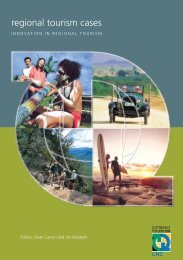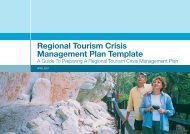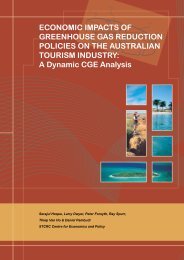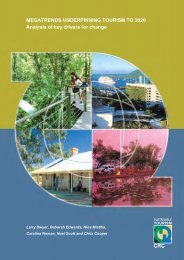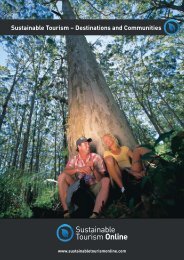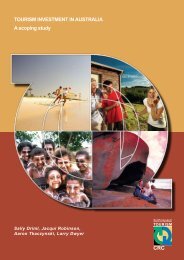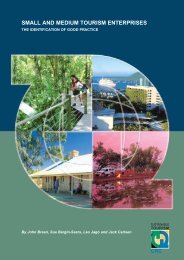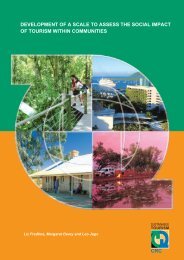Tourism Risk Management - Sustainable Tourism Online
Tourism Risk Management - Sustainable Tourism Online
Tourism Risk Management - Sustainable Tourism Online
You also want an ePaper? Increase the reach of your titles
YUMPU automatically turns print PDFs into web optimized ePapers that Google loves.
of the tsunami; for matters such as terrorism, crime, the outbreak of medical pandemics, etc. Each<br />
of these strategies had a potential impact on the destination and tourism operators and associated<br />
businesses, however the tourism industry was having difficulty in responding to the implications of<br />
these various individual strategies. It was necessary to gather information on each of these<br />
strategies and it was decided to include tourism's response to these strategies in the new <strong>Tourism</strong><br />
<strong>Risk</strong> <strong>Management</strong> Strategy.<br />
The Phuket <strong>Tourism</strong> <strong>Risk</strong> <strong>Management</strong> Strategy is a brave new initiative by the Phuket tourism<br />
industry and the associated government agencies. It has already been demonstrated that much can<br />
be achieved by all working together. The tourism industry and its organizations will have one<br />
strategy to manage, which will focus on all potential risks. It will provide roles and responsibilities for<br />
each tourism organization to undertake. It is expected that it will take a few years for the industry to<br />
fully address all of the possible actions that need to be taken. Government support and funding may<br />
also be required to assist with implementation of some actions, such as staff training.<br />
This is still a work in progress, but an important start for Phuket and Thai tourism to address critical<br />
strategic risk issues facing the industry in the future. By being more knowledgeable and aware;<br />
better prepared and more able to manage the impacts of a crisis; the destination will be stronger,<br />
safer and more secure for visitors and should be more competitive on the world tourism stage.<br />
(Source: Kean, I: APEC International Centre for <strong>Sustainable</strong> <strong>Tourism</strong>, 2006)<br />
Chapter Summary<br />
This chapter examines the crisis management strategies of prevention/mitigation, preparedness,<br />
response and recovery for a destination. It suggests the composition of, and tasks for, a destination’s<br />
crisis planning committee; identifies the key elements of a crisis response management plan;<br />
examines the training and exercising (testing) needs of an destination’s crisis management team;<br />
examines business continuity processes; and describes crisis recovery processes including<br />
debriefing. The chapter also highlights the need for destinations and operators to work with relevant<br />
government agencies and community organizations to develop effective partnerships for crisis<br />
management.<br />
Checklists for prevention, preparedness, response and recovery follow on the next pages.<br />
References<br />
Page, S., Yeoman, I., Munro, C., Connell, J. and Walker, L. (2006), ‘A case study of best practice—<br />
Visit Scotland’s prepared response to an influenza pandemic’, <strong>Tourism</strong> <strong>Management</strong>. Volume 27,<br />
pp.361-393<br />
<strong>Tourism</strong> <strong>Risk</strong> <strong>Management</strong> – An Authoritative Guide to Managing Crises in <strong>Tourism</strong> 67



